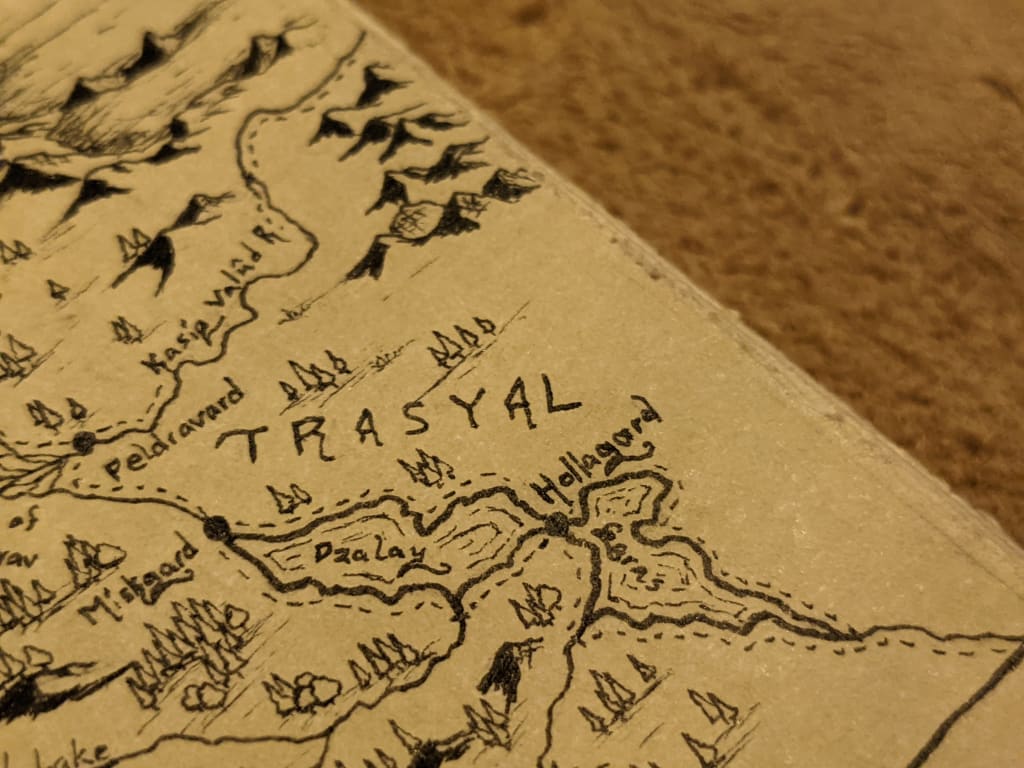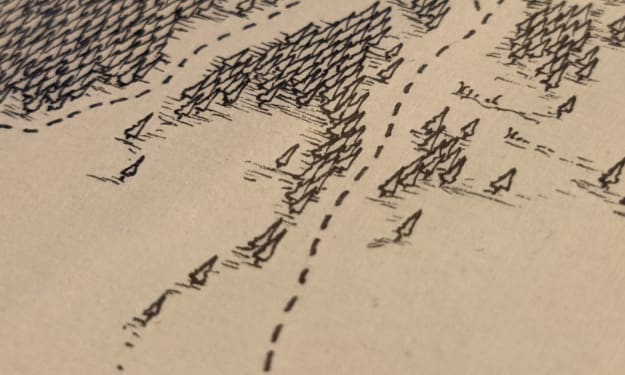Death Danced Betwixt the Lakes
and her dancers paid her well

Acrid hung the air about the city of Hollágard. It was the kind of air that burned the eyes and stung the nose; that left the throat as parched as the desert, and parted with a foul taste. An oppressive air filled with unfriendly smoke, mingled with death.
Death, it seemed, had come to enjoy the city of Hollágard. And why not? It was (or had been) a beautiful place, perched on the jagged Continental Divide and flanked by the lakes Dzalay to the west, and Garas to the east, which each flowed in their respective directions to the sea. Carved of wood and stone, it was the beating heart of the Doskovy province of Trasyal, and in happier times had pumped the sweet nectars of mead and honey across the continent. The belligerents of the civil war seemed to think it beautiful, too, and had introduced Death to the city.
The Abolitionists had claimed it first. In the early days of the war, when news of the atrocities of the church had first spread, and passions ran like hot honey, the enemies of the church had been swift to march on the city of the lakes. Their struggle was brief, for few dared oppose them, and the city of Hollágard found itself free from the tyranny of those who spoke on behalf of the spirits.
Death was a friend of the Abolitionists in those days, and together they celebrated their newfound freedoms. Free from persecution, from fear, and from the shackling of magic, the Abolitionists guided Death through the city, and introduced her to foreigners, and healers, and priests alike—anyone they thought likely of plotting with the church. Keen to meet these hesitant suitors, Death followed her friends as they pursued their freedom, and danced with those they met. But Death, ever fickle, grew tired of dancing in attics, and sewers, and alleys, and sought friends elsewhere who could introduce her to more refined folk.
For the Abolitionists, short-lived seemed their affair with Death, and was not long before the Restorationists sought the beauties of Hollágard for themselves. Dauntless, and with Death on their side, the warriors of the church laid siege to the city. Within a fortnight they had taken it, and the Abolitionists were forced to flee with their freedoms. Soon, the city of Hollágard found itself once more under the guidance of the church.
Already acquainted, Death did not shy away from befriending the soldiers of the church as they celebrated their restored order. ORder in the distribution of justice, in the face of fear, and in the use of magic, the Resroationists guided Death through the city, and introduced her to beggars, and sages, and scholars alike—anyone they thought guilty of heresy. Keen to meet her old comrades in this new light, Death followed her new friends as they pursued their order, and danced with those they met. But Death, ever distracted, grew tired of dancing in prisons, and gibbets, and towers, and sought dances elsewhere. Across the continent, she was ever sought after.
So, Death departed the City of the Lakes, if only for a time. She was sure to write letters, and send gifts, and even visited on occasion, but in the ebb and flow of the war, Hollágard seemed increasingly unimportant to Death’s companions. Even when the Reformationists, who sought to reform the church, rather than ruin it, forced the calm waters of the war in its twilight years to come rushing back, Hollágard was little more than an obstacle to which Death gave a passing wave.
It seemed that Death would dance no more when peace settled over the land. Seven long years of her waltzes had left the people of Doskoval exhausted beyond respite. Even in Hollágard, which had been comparably spared, the one-time companions of Death—Abolitionists, Restorationists, and Reformationists alike—balked at the thought of another dance. Death, however, had sampled the city like a seven-course meal, and was pining for an eighth. Death would come for dessert.
The first the people of Hollágard heard of it was as a whisper from Alasgard—the capitol—to the west. Traders and travellers spoke in hushed voices of the sudden departure of friends; of people who had been in the prime of life dropping unexpectedly, and unexplainably, cold as stone. If the civil war had been a waltz, then the Silent Death was jig—rising as suddenly, but with none of the joy.
Of all the cities of Doskoval, Hollágard was among the hardest hit. Death came to dance betwixt the lakes, and this time she would dance not only in the sewers and attics and prisons and streets, but she would dance everywhere. She would dance with all.
Born by foul wind or water or beasts or curse—no one really knew—the Silent Death roared through Hollágard like a mountain storm. On the first day of its revelry, no one seemed ill. Then, in a frightful way, Death would get up and dance with two, twelve, thirty, a hundred—the number of dancers became a torrent. One cough was all the warning Death gave, and for a week she paraded through the streets until there was nearly no one left to dance with. Then she was gone, and the sudden plague with her, leaving what few survivors there were to pick up the pieces.
***
Now, she danced around one of the many pyres—a parting jig to one of her ill-fated suitors. She was following the shambling footsteps of a man robed in black, twirling as the haunted priest lit the pyres. She would not dance with him now, just as she had not danced with him as he hid in the sewers during the days of the war. She would rather follow and flirt with his exhausted frame as he completed his work—a servant cleaning up after his master’s night of revelry.
He was nearly done, and he stumbled as he approached the last pyre. In his hand, he clutched a small black book, though his tongue had long ago memorized its contents. He brought it to his heart for comfort as he coughed the words of parting prayer over the limp victim of Death’s jig. From his pouch he pulled a single coin and placed it between the jowls of the dancer. With a final sigh, he made the sign of fire with his hand, and kindled the dry wood beneath—the final dancing floor.
As the pyre crackled to life, and Death danced in the smoke, his legs collapsed beneath him. He caught her eye as he did, and she wondered if she might dance with him today after all. But no…weary though they were, his eyes were still alert, and staring. Staring over twenty-thousand pyres for twenty-thousand dancers bearing twenty thousand coins. In a sudden, frightful week, Death had danced between the lakes, and become rich.
About the Creator
Enjoyed the story? Support the Creator.
Subscribe for free to receive all their stories in your feed. You could also pledge your support or give them a one-off tip, letting them know you appreciate their work.






Comments
There are no comments for this story
Be the first to respond and start the conversation.